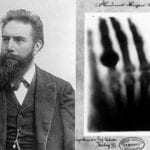 Movies and TV
Movies and TV  Movies and TV
Movies and TV  History
History 10 Momentous Events That Also Occurred on July 4th
 Animals
Animals 10 Times Desperate Animals Asked People for Help… and Got It
 Movies and TV
Movies and TV 10 Movie Flops That Found Their Way to Cult Classic Status
 History
History 10 Things You Never Knew About Presidential First Ladies
 Movies and TV
Movies and TV 10 Zombie Movies That Will Actually Terrify You
 Humans
Humans 10 Times Scientists Were Absolutely Sure… and Absolutely Wrong
 Our World
Our World 10 Pivotal Moments for Life on Earth
 Movies and TV
Movies and TV 10 Most Realistic Medical TV Shows of All Time
 Creepy
Creepy 10 Eerie & Mysterious Ghosts of the Pacific Coast
 Movies and TV
Movies and TV 10 Music Biopics That Actually Got It Right
 History
History 10 Momentous Events That Also Occurred on July 4th
 Animals
Animals 10 Times Desperate Animals Asked People for Help… and Got It
Who's Behind Listverse?

Jamie Frater
Head Editor
Jamie founded Listverse due to an insatiable desire to share fascinating, obscure, and bizarre facts. He has been a guest speaker on numerous national radio and television stations and is a five time published author.
More About Us Movies and TV
Movies and TV 10 Movie Flops That Found Their Way to Cult Classic Status
 History
History 10 Things You Never Knew About Presidential First Ladies
 Movies and TV
Movies and TV 10 Zombie Movies That Will Actually Terrify You
 Humans
Humans 10 Times Scientists Were Absolutely Sure… and Absolutely Wrong
 Our World
Our World 10 Pivotal Moments for Life on Earth
 Movies and TV
Movies and TV 10 Most Realistic Medical TV Shows of All Time
 Creepy
Creepy 10 Eerie & Mysterious Ghosts of the Pacific Coast
10 Everyday Expressions That Are Much Older Than You Think
The modern English language is peppered with new terms and abbreviations that did not exist 100, or even 50, years ago. Some of these new terms originated as a result of developments in technology. Others were a response to popular trends within pop culture. But some of the terms we use almost every single day are much older than you can possibly imagine.
10 OK

Many origins of “OK” have been suggested, but the most prominent theory is that it started as an editorial joke in 1839. At the time, an easy way to make your article trendy was to fill it with playful abbreviations such as “s.p” (small potatoes). But often, abbreviations used alternate spellings. “O.w,” for example, stood for “oll write,” and “o.k” stood for “oll korrect.”
Most abbreviations faded, yet “OK” stuck. Supposedly, this was because Martin Van Buren’s fans used the word when they set up the “OK Club” during the 1840 election. “OK” was said to represent Van Buren’s nickname, “Old Kinderhook.”
After the club got into disagreements with William Henry Harrison supporters, “OK” became a popular slander term that came to mean “out of karacter,” “orful katastrophe,” “orfully confused,” and so on.
After that point, “OK” stuck around because it was a handy abbreviation to use with the telegraph.
9 OMG

The earliest recorded use of “OMG” goes back as far as 1917 in a letter penned by Admiral John Arbuthnot Fisher to Winston Churchill.
In the famous letter, Fisher complains about the state of affairs of the British navy during the war before ending his note with a joke: “I hear that a new order of Knighthood is on the tapis—O.M.G. (Oh! My! God!)—Shower it on the Admiralty!!” It’s interesting to note that Fisher was 76 years old when he wrote this letter.
The relationship between Fisher and Churchill was complex. In 1911, Churchill brought Fisher out of retirement to head the Royal Navy, but Fisher retired again in 1915 as a result of the failing Gallipoli Campaign. Still, their relationship remained cordial enough for a friendly exchange of notes.
8 F—k

One of the most amusing theories for the origin of the word “f—k” must be the myth that the king of England once issued a proclamation that urged people to “Fornicate Under Command of the King,” known as “F—K” for short. In reality, the word “f—k” is of Germanic origin and is related to Dutch, Swedish, and German words meaning “to strike” and “to move back and forth.”
The word was first recorded in 1528, scrawled in the margins of a Latin manuscript. Apparently, an anonymous monk was reading through a guide to moral conduct known as De Officiis when he felt the urge to scrawl down “O d f—kin Abbot” in the margin of the text.
We know that “f—k” was used widely in common speech during the 16th century because it was included in John Florio’s Italian-English dictionary of 1598. However, “f—k” was not used as a swearword during that period. It was simply an impolite word for sexual intercourse. It wasn’t until the mid-19th century that “f—k” began to be used as a way of insulting others or expressing extreme emotions.
7 Dude

The word “dude” was first used in 1883 and seems to have been derived from the word “doodle” or, more specifically, from “Yankee Doodle Dandy.”
Apparently, the original New England Yankee Doodle was a country bumpkin who stuck a feather in his cap and called it macaroni, thus likening himself to the fashionable “macaroni” fellows of 18th-century England.
In 1883, this inspired someone to call young dandy men of New York City “doods” or “dudes.” These “dudes” were described as “tight-trousered, brief-coated, eye-glassed, fancy-vested, sharp-toes shod, vapid youth.”
A female counterpart of the “dude” was known as a “dudine.” How the “dude” of 1883 developed into the “dude” we know today is somewhat of a mystery.
6 Xmas

Some people argue that spelling “Christmas” in the form of “Xmas” is almost a form of blasphemy. It takes the “Christ” out of “Christmas” and is really nothing more than pure laziness.
However, it is believed that the letter “X” represents the Greek letter “Chi,” which is the first letter of the Greek word for Christ.
In fact, evidence suggests that “Christmas” has been abbreviated for at least 1,000 years but not in the same form in which we see it today. In an Anglo-Saxon chronicle that dates back to 1021, for example, Christmas has been abbreviated as “XPmas.”
5 Nerd

It was in the early 1950s that the word “nerd” became an essential part of teen slang. In 1951, an article in Newsweek proclaimed, “In Detroit, someone who once would be called a drip or a square is now, regrettably, a nerd.” In 1954, the word was included in a guide to teen slang known as Real Gone Lexicon and thus became “official.”
The word’s origins, however, are hazy. According to one popular theory, the word “nerd” originated with Dr. Seuss in his 1950 children’s book If I Ran the Zoo. In the book, the narrator declares that if he ran the zoo, he would “sail to Ka-Troo” and collect “a Nerkle, a Nerd and a Seersucker, too!”
But this leaves the question as to how the word then entered teen lexicon. Why was “nerd” picked out of all other words used in the book, and why would teens be reading Dr. Seuss anyway?
Other “nerd” origin theories exist. For example, it may be a play on the word “turd” or a shortening of “ne’er-do-well.” But according to etymologists, these theories are highly unlikely.
4 LOL

The Internet is full of stories of someone’s parents or grandparents accidentally using “LOL” (which stands for “Lots of Love,” or so they think) in the most inappropriate situations. Of course, most of us know that “LOL” actually stands for “laughing out loud” and that it originated in the 1980s.
However, you might be surprised to learn that “LOL” was first used in the 1960s and was actually doctor’s slang for “little old lady.” Sometimes, the abbreviation was extended to “LOLINAD,” which stood for “little old lady in no apparent distress.’’
In the 1960s and 1970s, NASA’s Apollo mission computers used “LOL memory.” This was named after the former textile workers—“little old ladies”—who wove the software together out of copper wire.
3 Freelance

Today, the term “freelancer” describes someone who works independently. It sounds like a modern word, but it is generally believed that it originated between the 14th and 16th centuries.
Back then, medieval mercenary knights with no particular allegiance would often take their lances into battle for the most money, whether it was paid by a prince or a state.
In 1819, the term was popularized in Sir Walter Scott’s historical novel Ivanhoe: “I offered Richard the service of my Free Lances, and he refused them . . . thanks to the bustling times, a man of action will always find employment.”
2 Twerk

“Twerking” was recently popularized by Miley Cyrus, but its origins date back to as early as 1820. Back then, it was spelled as “twirk” and was used as a noun to describe a twisting or jerking movement.
By 1848, “twirk” had turned into a verb. Fifty years later, its spelling changed slightly. An “e” was substituted for the “i,” and the previous “twirk” became “twerk.”
How “twerk” went from a word that described a jerking movement to a word that describes a particular type of dance move is a mystery, but it may have had something to do with the “Bounce” music scene of New Orleans in the 1990s. Back then, the term “twerk” was mostly associated with DJ Jubilee’s record “Do the Jubilee All,” which included the line “Twerk baby, twerk baby, twerk, twerk, twerk.”
1 Pussy

Nowadays, the word “pussy” is mostly used when talking about sex. It can refer to the female sexual organ or, in an insulting sense, the female herself. Sometimes, it is also used as a slur against cowardly men. And still other times, although very rarely, it can also refer to a cat.
Like most words, the origin of “pussy” is a bit of a mystery. Some, like Bob Garfield and Mike Vuolo, the hosts of the podcast Lexicon Valley, claim that the word “pussy” first appeared in the late 1500s in the work of an English pamphleteer Philip Stubbs.
Stubbs apparently used the word “pussy” to refer to a woman in a nonsexual manner. The Oxford English Dictionary concurs and suggests that “pussy” referred to a girl or a woman with characteristics of a cat.
Others claim that languages such as Old Norse and Old English have words similar to “pussy” that mean either “vulva” or “pocket.” They believe that it must have been from these words that “pussy” was derived.
Wherever the word came from, it seems that “pussy” was first used to refer to a woman’s vagina in a vulgar country song from the 1600s.
Laura is a student from Ireland in love with books, writing, coffee, and cats.








